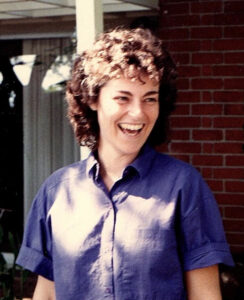About Linda Lancaster
Linda N. Lancaster
1952-1989

I chaired the Linda N. Lancaster Professional Development Fund committee from its inception in 1989 to shortly before my retirement in 2019. Linda was my teaching assistant, and although her time at UMaine was tragically cut short, I’d like to think I came to know her well. I write this brief note for the ages, realizing that, with my retirement, I no longer am easily available to answer the recurring question, “So, just who was Linda Lancaster?” You may already know she was an exceptionally talented doctoral student in our counselor education program; that she was struck down by a drunken driver on February 18, 1989, while walking on an Orono sidewalk with a fellow doctoral student; and that her parents established the Linda N. Lancaster Professional Development Fund in her memory. The additional information below, while grossly inadequate to fully capture the life and character of this remarkable woman, will at least give you some sense of the person behind the name.
Theodore Coladarci, Professor Emeritus
July 17, 2019
Linda was born to Russell and Eleanor Nicholson on February 8, 1952, in the Kingdom of Saudi Arabia, where Russell worked for two decades. In 1958, the parents asked Stanford University professor H. P. McDaniel to conduct an educational evaluation of Linda as they planned for her education in a foreign country. “She is one of only six such people I have met in my entire career,” Professor McDaniel said of six-year-old Linda. “She can do anything, and will pursue what she has to do—and neither you nor I can stop her.”
Linda attended school in Saudi Arabia, and graduated from high school in Lugano, Switzerland. She later matriculated at George Washington University, where she received a baccalaureate in psychology. Extensive world travel greatly influenced her outlook on life.
Linda’s sense of fairness and her awareness of the needs of the less fortunate prompted her to join the Federal Bureau of Prisons. Her career took her to correctional facilities across the nation, where she encouraged both inmates and staff to achieve their potentials; instituted innovations, including drug testing and rehabilitation; and advocated for the rights of women.
In 1980, Linda became the first woman to be designated Executive Assistant to the Director of the Federal Bureau of Prisons. In this capacity, Linda directed the agency’s involvement with Congress, the Supreme Court, the Office of the U.S. Attorney General, and the White House. In 1984, as Associate Warden, she was instrumental in opening the Federal Medical Center in Rochester (MN). After Linda’s death, a former director of the Federal Bureau of Prisons observed, “In addition to possessing a keen mind, Linda was a personable and caring individual who went out of her way to assist those less fortunate than herself.” Indeed, the irony attending Linda’s death did not go unnoticed: In an alternate universe, as a Los Angeles Times article noted, Linda easily could have been providing alcoholism counseling to the very man who ultimately struck her down.
Linda took leave of the Federal Bureau of Prisons in 1987 to begin doctoral study in the College of Education at UMaine. As a student in the counselor education program, Linda enriched the courses she took, the counseling practica she oversaw, and the programs of research in which she participated. As my teaching assistant for an undergraduate class enrolling roughly 200 students a term, Linda had an enormous impact on the personal and academic lives of countless students in the two years she worked with me in that role. Upon her death, five weeks into the spring semester, students from the class wrote a moving testimony to Linda for the student newspaper. They opened by declaring, “The last five weeks have really given us an optimistic outlook on college and teaching assistants.” They then described the many academic supports Linda tirelessly provided, concluding with the sentiment, “Linda Lancaster is going to be an extremely tough act to follow, and she will be missed and remembered by many!”
Not surprisingly, Linda was deeply involved with the international student community. She often made a special effort to acquaint newly arrived foreign students with the campus and, in general, with life in America. This extended to spouses as well. Once, a Saudi spouse had been reluctant to return to Orono from vacation in her home country. Her husband, a graduate student, said his wife’s personal relationship with Linda was instrumental in her ultimately returning. Perhaps it is in this spirit that another Saudi student said, “East met West in Linda.”
Our doctoral students tend to be quite good, but a few are special. Linda was special among the special, and it is particularly special that she lives on through the activity of the Linda N. Lancaster Professional Development Fund. As her mother said to me in November of 1989, “The rewards of the Fund are more than monetary—if there is a glimmer of peace through these past months of horror, it is knowing that Linda is still reaching out to help others as she always did.”
